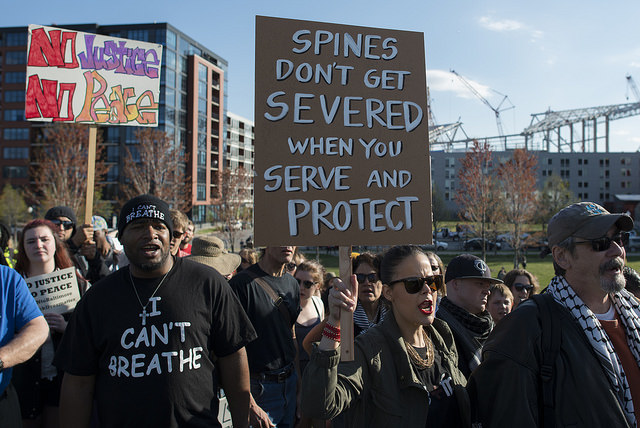
cc
It has been a week. A week since peaceful protests were transformed into an uprising. A week since the eyes of the world descended on the city to watch images that, since the dystopian experience of those living the protest and militarized police response in Ferguson, MO last year, have become increasingly familiar: flames, destruction of property, police arresting young black men.
For many of those of us just tuning in that Monday night, to see footage of young men with bricks up against the increasingly familiar image of police in riot gear: body armor and clear shields. The image, of young bodies in hoodies facing off against adults in body armor carries with it a deep sense of tragedy.
And for many of us, a profound sense of the future. That we are living in a different age. Even as the internet memes the images of Selma against Ferguson and 1968 Baltimore against 2015, we are part of something different. Progression is the wrong word for it, I think. What fifty years has brought us. We are at a moment.
Most of us, tuning in last Monday, thought we were witnessing an event. We think we are looking at the whole story. The death of Freddie Gray is the prologue, but this is the event. This seems to be our culture’s preferred view of history: separate defining moments.
What we have seen in Baltimore isn’t an event. It is what happens when we catch things after so much has already transpired. Like walking into the kitchen to find a pot boiling over, but we’re not sure what’s in the pot, or how long its been like this.
Or how many pots have boiled over already. Or whose kitchen we’re in.
Phyllis Tickle argues for the long arc of history in her Emergence books. She says that the fateful day when Martin Luther nailed some radical ideas to a church door is not the day the Great Reformation began: it had been going on for a long time. It was just the touchstone for the narrative that historians and church people tell each other. It was, of course, a defining moment. But it was a moment with infinite preceding moments: each of brought an end to the old world and ushering in a new world which would be completely different. A world that had been changing for more than a century before and would change for more than a century after.
For Tickle, Luther’s big defining moment didn’t start the changing world: it was the moment the world noticed it had long been changing.
Perhaps this moment is one of those for us. I sort of hope it is. Because I’m tired of our blindness to racism and injustice and our disregard for the plight of decent people.
I also hope that it is part of something much bigger. A renewed call to justice and hope and fidelity to the pain of our neighbors. Because I’m not in the protecting the comforts of the world business. I’m in the Kingdom business. And the hallmark of the kingdom is justice. Justice for the people who need it most. Like our neighbors in Baltimore and all the mothers and fathers and sisters and brothers and daughters and sons who keep losing Freddie Grays to a state of injustice.
I hope things are changing because that is the very substance of faith in a GOD that liberates and transforms. A GOD who entrusts us with that same mission. A GOD who wants so much more from us than we have been willing to give.
Until now.

Leave a Reply